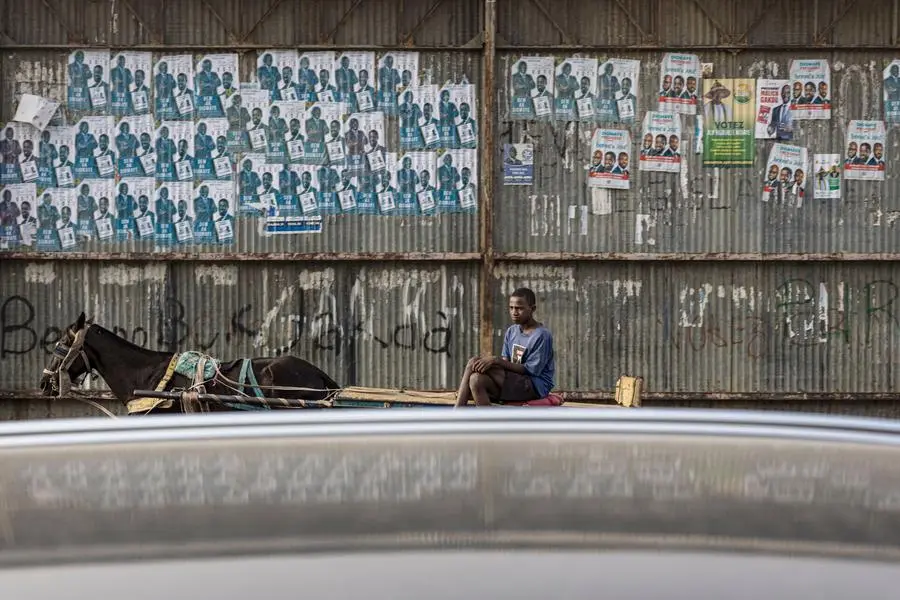PHOTO
Senegal's presidential candidates were set to make their final pitches to voters Friday, marking the end of a rushed campaign for what is considered an unprecedented election after weeks of political crisis.
Seven million people are eligible to vote Sunday in the traditionally stable West African nation set to become an oil producer, but where more than a third live in poverty and half the population are aged under 20.
After the last-minute withdrawal of two candidates, 17 contenders remain in the race for president, with campaigning officially due to end at midnight Friday.
Whoever comes out on top will be tasked with steering the nation out of years of tension and managing revenues from recently discovered oil and gas reserves.
President Macky Sall, in power since 2012, is not standing again, making it the first Senegalese poll where the incumbent will not feature on the ballot.
Two former tax inspectors are considered the favourites to win -- the governing coalition's candidate and ex-prime minister Amadou Ba, 62, and anti-establishment opposition figure, Bassirou Diomaye Faye, 43.
Faye was only released from prison last week, nearly a week into the electoral campaign, together with popular and charismatic firebrand Ousmane Sonko, who is barred from standing but backs Faye.
"We know that these are the two who will emerge if there is no tsunami," said El Hadji Mamadou Mbaye, a political science lecturer and researcher at the University of Saint-Louis, referring to Ba and Faye.
"The whole issue will come down to the third (place candidate) who will be the referee," he added.
The former mayor of the capital Dakar, Khalifa Sall, 68, has been mentioned as a possible third place candidate in the first round.
A second-round vote is likely given the number of candidates and the need for an absolute majority, but no date has yet been set.
Faye is due to hold his final rally at 4:00 pm (1600 GMT) in the western town of Mbour, while Ba has said his will take place in Dakar and its suburbs.
- Foreign interest -
Senegal was originally due to vote on February 25, but an 11th-hour postponement by President Sall triggered the worst political crisis in decades and unleashed unrest that left four dead.
Sall finally set the date of March 24 under constitutional pressure, which shortened the campaign period from three to two weeks and coincided with the Muslim fasting month of Ramadan.
International partners will be closely monitoring the vote in the country of 18 million.
With 39 percent of people living in poverty, according to the UN World Food Programme, many set off in boats on treacherous sea routes aiming to reach Europe.
Senegal has traditionally been considered a beacon of stability in coup-hit West Africa, maintaining close ties with the West while neighbouring Sahel states pivot towards Russia.
The country is also due to begin oil and gas production later this year following the discovery of offshore reserves.
Adding to the stakes, Senegal has witnessed bouts of deadly unrest since 2021, triggered partly by a stand-off between Sonko and the state.
Sonko's rhetoric emphasising sovereignty and attacking elites, multinationals and former colonial ruler France has drawn a passionate following among young people.
- 'Hungry for change' -
Since his release from prison following an amnesty law, Sonko has featured heavily on the campaign trail alongside Faye, who pitches himself as the "candidate for system change" and "left-wing pan-Africanism".
"I think young people are hungry for change. It's true that in our countries we have candidates who have been around since the 1960s, so we still need new blood," said political science lecturer Mbaye.
But Amadou Ba has urged people to vote "for experience and competence instead of entrusting the reins of the country to adventurers".
Ba says he wants to ensure stability and the continuation of Sall's multi-year development plan.
However, the president's legacy also includes persistent poverty, with unemployment officially at 20 percent, high debt, and the arrest of hundreds of opponents.
The desire for calm "is going to play a big part (in the election)," said Sidy Diop, deputy editor of Le Soleil daily.
"We are coming out of a very tense period. All the candidates are presenting themselves as the one who will reconcile the Senegalese people," he added.
Provisional results could be known as early as Sunday night.




















